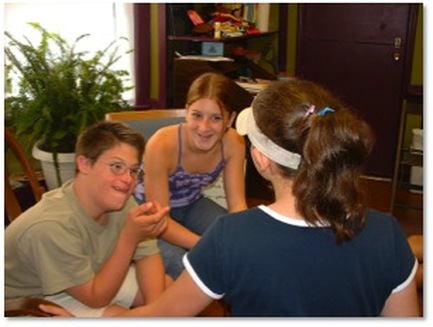Functional Emotional Developmental Levels
1. Shared Attention/Regulation and Interest in the World
The child’s ability to regulate his or her attention and behavior while being interested in the full range of sensations (sights, sounds, smells, their own movement patterns, etc.). The child’s ability to enter into a state of shared attention with another person. This is a child’s ability to process their environment, filter out distractions, engage with others, and attend to play or tasks (ex. pay attention in the classroom).
2. Engagement/Forming Relationships
The child’s ability to engage in relationships, including the depth and range of his/her pleasure and warmth. The related feelings, such as assertiveness or sadness, can be incorporated into the quality of engagement and the stability of the child’s engagement (ex. does he/she withdraw or become aimless when under stress?).
3. Two-Way, Purposeful Interactions with Gestures/Intentional Two-Way Communication
The child’s ability to enter into two-way purposeful communication. At its most basic level, this involves helping a child open and close circles of communication. This is a child’s ability to be intentional in interactions and activities. For example, a child is able to initiate with another person to keep activities going for desired objects or activities, etc.
4. Two-Way, Purposeful Problem-Solving Interactions/Development of Complex Sense of Self
The ability to string together many circles of communication and problem solving into a larger pattern (ten or twenty). This is necessary for negotiating many of the most important emotional needs in life (being close to others, exploring and being assertive, limiting aggression, negotiation safety, etc.). This is the stage where the child begins to develop a sense of self/self-esteem/independence (“I did it!” or “Look what I did!”), using affect, gestures and words, if verbal.
5. Elaborating Ideas/Representational Capacity and Elaboration of Symbolic Thinking
The child’s ability to create mental representations. The ability to do pretend play or use words, phrases or sentences to convey some emotional intention (“What is that?,” ”Look at this fish!,” or “I’m angry!,” etc.). the child begins to have his own ideas and share them with the people around him. This is the ability to share ideas with others and represent ideas and real life through play or activities.
6. Building Bridges Between Ideas/Emotional Thinking
The child’s ability to make connections between different internal representations or emotional ideas (“I’m mad because you’re mean.”). This capacity is a foundation for higher level thinking, problem solving and such capacities as separating fantasy from reality, modulating impulses and mood, and learning to concentrate and plan.
The child’s ability to regulate his or her attention and behavior while being interested in the full range of sensations (sights, sounds, smells, their own movement patterns, etc.). The child’s ability to enter into a state of shared attention with another person. This is a child’s ability to process their environment, filter out distractions, engage with others, and attend to play or tasks (ex. pay attention in the classroom).
2. Engagement/Forming Relationships
The child’s ability to engage in relationships, including the depth and range of his/her pleasure and warmth. The related feelings, such as assertiveness or sadness, can be incorporated into the quality of engagement and the stability of the child’s engagement (ex. does he/she withdraw or become aimless when under stress?).
3. Two-Way, Purposeful Interactions with Gestures/Intentional Two-Way Communication
The child’s ability to enter into two-way purposeful communication. At its most basic level, this involves helping a child open and close circles of communication. This is a child’s ability to be intentional in interactions and activities. For example, a child is able to initiate with another person to keep activities going for desired objects or activities, etc.
4. Two-Way, Purposeful Problem-Solving Interactions/Development of Complex Sense of Self
The ability to string together many circles of communication and problem solving into a larger pattern (ten or twenty). This is necessary for negotiating many of the most important emotional needs in life (being close to others, exploring and being assertive, limiting aggression, negotiation safety, etc.). This is the stage where the child begins to develop a sense of self/self-esteem/independence (“I did it!” or “Look what I did!”), using affect, gestures and words, if verbal.
5. Elaborating Ideas/Representational Capacity and Elaboration of Symbolic Thinking
The child’s ability to create mental representations. The ability to do pretend play or use words, phrases or sentences to convey some emotional intention (“What is that?,” ”Look at this fish!,” or “I’m angry!,” etc.). the child begins to have his own ideas and share them with the people around him. This is the ability to share ideas with others and represent ideas and real life through play or activities.
6. Building Bridges Between Ideas/Emotional Thinking
The child’s ability to make connections between different internal representations or emotional ideas (“I’m mad because you’re mean.”). This capacity is a foundation for higher level thinking, problem solving and such capacities as separating fantasy from reality, modulating impulses and mood, and learning to concentrate and plan.
|
7. Multi-Cause, Comparative, and Triangular Thinking (Grade School Children)
The child is able to explore multiple reasons for a feeling, comparing feelings, and understanding triadic interactions among feeling states (ex. “I feel left out when Susie likes Janet better than me.”). Finding an indirect road to problem solve (ex. “John wants to be Sara’s friend.”). He sees that Tom is Sara’s friend, so John becomes Tom’s friend. This type of thinking is more expansive and even a little manipulative. He learns to “work the crowd” to satisfy his social needs. During this stage the child becomes more interested in his/her body and sexual relations. These feelings may cause the child to be fearful. Nurture him/her through these fears and help them to understand their feelings. It is a good sign when a child becomes manipulative in a triangular way. When understanding the three-person system, the child becomes interested in all facets in their world: sex, death, where did I come from? etc. |
8. Emotionally Differentiated Gray-Area Thinking (Grade School Children)
Shades and gradations among different feeling states, the ability to describe degrees of feelings about anger, love, excitement, disappointment, etc. (ex. “I feel a little annoyed.”). The child begins to know where they fall on the social ladder. They begin to define themselves by how accepted they are by their peer group. He/she begins to see the “shades of gray” and becomes a better problem solver. He/she can also see consequences of their behavior. The child is able to give you a range of emotions (ex. “I’m a little mad, very mad, etc.” or “I’m the best, Jo is second best, and John is the worst.”).
9. Intermittent Reflective Thinking, a Stable Sense of Self, and an Internal Standard (Grade School Children)
Reflecting on feelings in a relationship to an internalized sense of self (“It’s not like me to feel so angry.” or “I shouldn’t feel this jealous.”). The child begins to internalize values and develops a greater sense of self that can’t be broken down by lack of acceptance by a peer group (ex. “Sally was mean to me because she was having a bad day, but I am still a good person.”).
Shades and gradations among different feeling states, the ability to describe degrees of feelings about anger, love, excitement, disappointment, etc. (ex. “I feel a little annoyed.”). The child begins to know where they fall on the social ladder. They begin to define themselves by how accepted they are by their peer group. He/she begins to see the “shades of gray” and becomes a better problem solver. He/she can also see consequences of their behavior. The child is able to give you a range of emotions (ex. “I’m a little mad, very mad, etc.” or “I’m the best, Jo is second best, and John is the worst.”).
9. Intermittent Reflective Thinking, a Stable Sense of Self, and an Internal Standard (Grade School Children)
Reflecting on feelings in a relationship to an internalized sense of self (“It’s not like me to feel so angry.” or “I shouldn’t feel this jealous.”). The child begins to internalize values and develops a greater sense of self that can’t be broken down by lack of acceptance by a peer group (ex. “Sally was mean to me because she was having a bad day, but I am still a good person.”).



